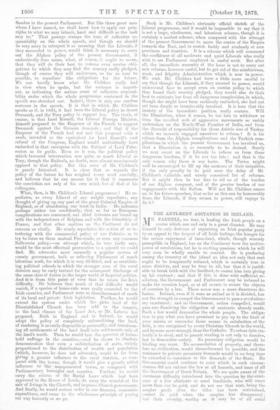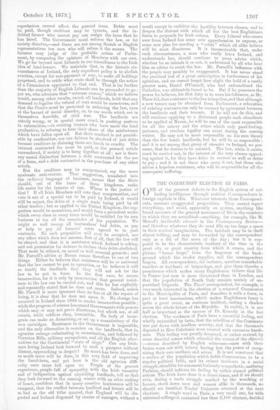THE ANTI-RENT AGITATION IN IRELAND.
MR. PARNELL, we fear, is leading the Irish people on a course which can end only in a great disaster. He may himself be only desirous of organising an Irish popular party by an appeal to the deepest of all Irish feelings, the hunger for the secure enjoyment of farm-land, which, though scarcely perceptible in England, has on the Continent been the motive- power of revolutions, but he is exciting passions which he will very soon be wholly unable to control. He is producing among the tenantry of the island an idea not only that rent ought to be temporarily reduced, which is certainly true in some districts, and may be true in all, but that it is justifi- able to break faith with the landlord, to coerce him into giving up his contract ; and that if this is done with sufficient re- solution, the Government and Parliament may be induced to make the coercion legal, or at all events to secure the objects of coercion by a law. There never was a more disastrous de- lusion. Ireland, even if it were as united as it is divided, has not the strength to compel the Government to pass a revolution- ary enactment ; and no Government, unless compelled, would pass one dissolving the obligation of contracts already made. Such a law would demoralise the whole people. The obliga- tion to pay what you have promised to pay up to the limit of your means, or surrender those means in satisfaction of the debt, is one recognised by every Christian Church in the world, and by none more strongly than the Catholic. To refuse debt vio- lently is to steal, and to permit stealing is not only to dissolve, but to demoralise society. No pecuniary obligation would be binding any more. No accumulation of property, and there- fore no civilisation, would thenceforward be possible, and the resistance to private pecuniary demands would in no long time be extended to resistance to the demands of the State. No Government could continue to exist which in such circum- stances did not enforce the law at all hazards, and least of all the Government of Great Britain. We are quite aware of the enormous difficulty introduced into the question by the exist- ence of a few obstinate or cruel landlords, who will exact more than can be paid, arid do not see that rent, being the surplus profit after the tiller has been maintained, cannot be paid when the surplus has disappeared ; but their severity, worthy as it may be of all social reprobation cannot affect the general issue. Debts must be paid, though creditors may be tyrants, and the in- debted farmer who cannot pay can resign the farm that he has hired. The Government must enforce the law, or let society dissolve,—and there are not among Scotch or Englis]i representatives ten men who will refuse it the means. The farmers may judge of the probable action of Parlia- ment, by comparing the opinions of Members with our own. We go far beyond most Liberals in our friendliness to the Irish idea of land-tenure. We maintain that, in the historic cir- cumstances of Ireland, the only expedient policy is to abolish eviction, except for non-payment of rent, to make all holdings perpetual, and to settle what rents shall be through the action of a Commission appointed to that end. That is far further than the majority of English Liberals can be persuaded to go ; yet we, who advocate that "extreme course," which we believe would, among other results, enrich all landlords, hold that any demand to legalise the refusal of rent would be monstrous, and that the Courts must be protected in enforcing the law, even at the hazard of social disorder, or, to use words which are in themselves horrible, of civil war. The landlords are utterly wrong, or in special cases cruel, in pushing matters to extremities,—in evicting tenants who have made the land productive, in refusing to bear their share of the misfortunes which have fallen upon all. But their conduct is not punish- able by confiscation, nor can debtors be absolved of just debts because creditors in claiming them are harsh to cruelty. The interest contracted for must be paid, or the pawned article surrendered, if society is to hang together at all ; nor is there any moral distinction between a debt contracted for the use of a farm, and a debt contracted in the purchase of any other article.
But the creditors may be compensated, say the more moderate anti-renters. That euggestion, translated into the oniinary language of business, means that the State should, out of the taxes of throe kingdoms, make life easier for the farmers of one. Where is the justice of that ? If all Irish Members will vote that compensation, and vote it out of a special tax to be paid by Ireland, it would still be unjust, the debts of a single trade being paid by all other traders; but as applied to the United Kingdom, the sug- gestion would be monstrous, and would form a precedent under which every class in every town would be entitled for its own business to tax all the remainder of the population. We might as well recoup all bootmakers' bad debts, as pay or help to pay all farmers' rents agreed to in past contracts. No such proposition will ever be accepted, nor any other which does not assume, first of all that the law will be obeyed, and that it is assistance which Ireland is asking, and not permission for debtors to declare their debts abolished. That must be refused, on moral as well as social grounds ; and Mr. Parnell's advice at Navan comes therefore to One of two things. Either he believes that resistance will be so universal that the law cannot be put in operation, or he believes it will so terrify the landlords that they will not ask for the law to be put in force. In the first case, he means insurrection, for it is only by insurrection that general resist- ance to the law can be carried out, and this he has explicitly and repeatedly stated that he does not mean. Indeed, unless Mr. Parnell is more ignorant than he has at all the repute of being, it is clear that he does not mean it. No change has occurred in Ireland since 1848 to render insurrection possible ; while the progress of science has armed Governments with powers which may or may not prove disastrous, but which are, at all events, while soldiers obey, irresistible. No body of insur-
gents manufactory of the gents can make an Armstrong, or set up
new cartridges. Resistance to the Government is impossible, and the only alternative is coercion on the landlords, that is, agrarian outrage culminating in assassination and followed by Coercion Bills, military occupations, and all the English alter- natives for the Continental "state of siege Can any Irish- man loving Ireland look forward to such a prospect without dismay, approaching to despair? So much baa been done, and so much more will be done, in this very field of improving the Land-laws, and yet here is the old agrarian diffi- culty once more full upon us. People of the gravest experience, people full of sympathy with the Irish tenantry and of indignation against unyielding landlords, tell us that they look forward to the coming winter with an utter sinking of heart, confident that in many counties lawlessness will be rampant, that the conflict between landlord and tenant will be as bad as the old tithe quarrel, that England will be dis- gusted and Ireland disgraced by stories of outrages, without a
result except to embitter the hostility between classes, and to deepen the distrust with which all but the best Englishinen listen to proposals for Irish reform. Every Liberal who comes over from Ireland has some new apprehension to express, or some now plan for meeting a "Crisis" which all alike believe
will be most disastrous. It is inconceivable that, under such circumstances, a man who really loves Ireland, and understands her, should continue to press advice which, whether he BO intends it or not, is understood by all who hear him as advice to resist the law. Mr. Parnell's influence with the people may possibly be exaggerated.It has never stood
i the practical test of a great subscription n furtherance of his agitation, and we cannot forget how slight the hold of a vastly greater man, Daniel O'Connell, who had enfranchised the Catholics, was ultimately found to be. • But if he possesses the power he believes, his first, duty is to warn his followers, as Mr. Shaw did, that resistance to the law is hopeless, and that although a new tenure may be obtained from Parliament, a relaxation of existing contracts can only be secured by agreement between the landlords and their tenants. If he will not do this; and will continue applying to a distressed people such stimulants as he applied at Navan, he will be one of the most responsible for all the misery and the crime which only good-feeling, patience, and resolute legality can avert during the coming winter. He may not be more responsible on his own theory than the few harsh landlords, but he will be as responsible ; and it is not among that group of enemies to Ireland, we pre- sume, that he desires to be counted. The law, while it exists, must be carried out, in the interest of the very classes appeal- ing against it, for they have debts to recover as well as debts to pay ; and it is not those who carry it out, but those who advise a hopeless resistance, who will be responsible for all the consequent suffering.



































 Previous page
Previous page